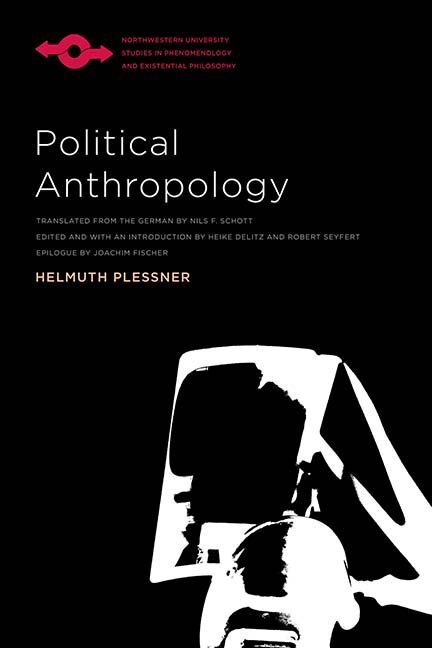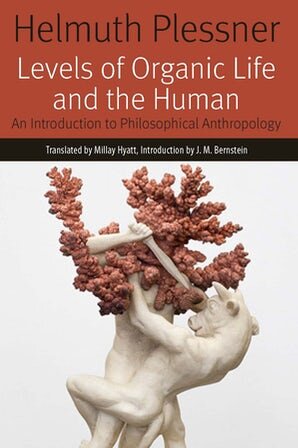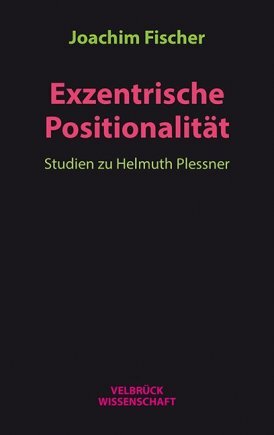Review: Plessner, ‘Political Anthropology’ and ‘Levels of Organic Life and the Human’ & Fischer, ‘Exzentrische Postionalität’
Review of Helmuth Plessner’s Political Anthropology, trans. Nils F. Schott, ed. and introduction by Heike Delitz and Robert Seyfert, epilogue by Joachim Fischer (Northwestern University Press, 2018), 130 pages; Helmuth Plessner’s Levels of Organic Life and the Human: An Introduction to Philosophical Anthropology, trans. Millay Hyatt, introduction by J. M. Bernstein (Fordham University Press, 2019), 448 pages; and Joachim Fischer’s Exzentrische Postionalität: Studien zu Helmuth Plessner (Velbrück Wissenschaft, 2016), 415 pages.
Reviewed by Austin Harrington
Though well-known in Germany, Helmuth Plessner (1892-1985) remains a much under-appreciated figure in the English-speaking world. One of the most brilliant and yet least familiar members of the circle around Max Weber during the First World War, Plessner is best known for his contributions to the twentieth-century German paradigm of thought known as philosophische Anthropologie – a rubric usually also understood to include the work of Max Scheler and Arnold Gehlen. These include Plessner’s early The Limits of Community, of 1924 – a critique of identitarian ideologies on both the left and the right of the political spectrum – and the book generally regarded as his magnum opus, Levels of Organic Life and the Human: An Introduction to Philosophical Anthropology, of 1928. Alongside these are Political Anthropology (1931), Laughing and Crying (1940), and many other monographs and essays.
Long neglected and only fully rediscovered in Germany after 1990, Plessner took inspiration in his early thinking from the work of Dilthey, Husserl, Bergson, Simmel, Jakob von Uexküll and his mentor at Heidelberg, the vitalist thinker Hans Driesch. Teaching at Cologne in the 1920s, he gained a position in exile in 1934 at Groningen in the Netherlands where he remained during the war (withdrawing into hiding in 1943-45), before returning to Germany in 1951 at Göttingen. Working briefly in the 1950s with Adorno and Horkheimer at the latter’s re-established Institut für Sozialforschung at Frankfurt, he also met Kracauer, Arendt and others during a one-year stay at the New School for Social Research in New York in 1962-63.
Political Anthropology is the book in which Plessner revisits the fundamental precepts of his philosophy of the human and thematises the sense in which these bear inherently on political life – including in particular on nationhood and conflict. A critique of the traditional sequestration of politics from philosophy in German ideas since the nineteenth century, the book offers one of the earliest critiques of the apolitical philosophy of Heidegger and looks forward in many ways to arguments subsequently more prominently developed by Hannah Arendt. Today it is an especially relevant text insofar as it expounds broadly a liberal-cosmopolitan politics of national territories and identities as essentially foundation-less placeholders in shifting relations of symbolic self-distinction, as well as a fiercely power-realist conception of ceaseless group self-assertion and contention. Many readers are likely to be reminded of themes of friend-enemy relations in the thought of Schmitt, and of concepts of hegemony and deconstructive subject-positions in the writings of figures from Foucault and Deleuze to Laclau and Mouffe and Agamben. Plessner indeed drew in part on Schmitt, and Schmitt cited Plessner a year later in the second edition of The Concept of the Political, from 1932. Yet, as Heike Delitz and Robert Seyfart emphasise in their introduction to the volume, Plessner also urges a way of thinking about antagonism and the political that highlights the civilizing of politics through institutions of law – even as these institutions remain always fictive, power-laden constructs.
Plessner’s philosophical anthropology begins from the premise that human existence is, in its evolutionary differentiation from plant and lower-animal life, “ex-centrically positioned”; that is, not bound by instinct, other to itself by relation to its own embodiment, and therefore always “open” in the sense of always governed by an unanswered question of its own meaning. Human existence is “unfathomable” or “foundation-less” (unergründlich). It has a “natural artificiality” or “mediated immediacy”. Human actors confront themselves ex-centrically and hence must always make themselves into “something” – which, however, they can only ever accomplish provisionally, through the differential projection of the other in themselves onto the otherness of others. A resultant variability and historicity of human existence makes such existence essentially political. Each indeterminate possibility of existence unleashes a struggle for power, whereby actors find themselves “uncanny” in relation to others – unheimlich in Freud’s sense – and strive to settle this uncanniness in some way through group association, including typically through the imposition of values and ideas with a universalizing claim.
Plessner’s Levels of Organic Life and the Human, which has recently been translated in English with an introduction by Jay M. Bernstein, is a complex work requiring a more detailed review than is possible here. But some points might be made about how this work and Political Anthropology both differ from and complement the kinds of line of approach more familiar to Anglophone readers from authors such as Laclau and Mouffe and others. In general, as Delitz and Seyfart emphasise in their introduction, Plessner suggests a way of thinking about the production of identities-in-difference less from a negative formal principle of the ‘constitutive outside’ (in the sense of post-structuralism’s ‘system of differences’) and more from a more immanent, agential aspect of the creative positing or instituting of society – somewhat more in the sense of Cornelius Castoriadis’s The Imaginary Institution of Society, or perhaps Benedict Anderson’s Imagined Communities. The foreign is negated, Plessner underlines, only because a more positive act of articulation must first arise as a response to the gap in human existence as “ex-centric positionality”. In this sense, Plessner’s approach traces a more phenomenological path that first grapples with the question of the human and humanistic in order to move beyond it to the more structurally determinant in political relations. One might say that where Foucault and others tend to break abstractly with humanism, Plessner seeks a conception of power, law and knowledge that begins from a sense in which identities are posited vitally and expressively in historical processes. This allows him to explore a quality of identities as problematically binding on those committed to them, such that self-relativization can occur only first by relation to a governing standpoint of perception to which the self is constitutively attached. Identities stand in need of de-centering because they remain at the same time expressively centering standpoints in search of clarification of themselves. Nationhood, including German nationhood, and “Europe” as an identity, contain in this sense not only the demand but also the resource of their own de-centering – precisely because they exist, from the outset, as structures of “ex-centric positionality”.
Among some of the most important studies of Plessner’s oeuvre over the past thirty years have been those compiled by the Dresden-based scholar Joachim Fischer, whose numerous articles are anthologized in the volume Exzentrische Positionalität: Studien zu Helmuth Plessner (2016). Synthesizing his own scholarship and others’, Fischer’s volume covers the central planks of Plessner’s contributions to sociology, philosophy and political theory, as well as Plessner’s key historical work of 1935, The Belated Nation, on the vicissitudes of German political development from empire to republic after 1918. The anthology provides a substantial appraisal of Plessner’s first book to be translated in English, Laughing and Crying: A Study of the Limits of Human Behavior (Northwestern University Press, 1970) – an engrossing study of the phenomenology of humour and grief as “ex-centric”, “ecstatic” states of the self, engaging in part with Bergson’s theory of comedy. And the volume also dwells extensively on Plessner’s The Limits of Community of 1924, a work that examines the constructed, role-driven character of social life as a play of forms and masks and still stands today as one of the most powerful analyses of the tendency of social movements to relapse into emotionalized inward-turning collectives. As Fischer discusses at length, Plessner’s Limits found renewed relevance in Germany after 1990 in the context of debates about the forging of a reunified German national civil society; and the work is also the central reference object for Helmut Lethen’s influential study of the “New Sobriety” in Weimar culture, translated in English in 2002 as Cool Conduct: The Culture of Distance in Weimar Germany (trans. Don Reneau, Berkeley: University of California Press). Particularly important to note are Fischer’s essays on Plessner’s thinking in the area of art and aesthetics, which remains poorly appreciated to date. These elucidate Plessner’s project of an “anthropology of the senses” – or “aesthesiology of the mind” – as well as Plessner’s highly original writings on the philosophy and sociology of abstraction in European painting from the early years the twentieth century, which also include a debate from the 1960s with the aesthetics of Adorno.
It is very much to be hoped that these rich and important texts find the impact they deserve.
Austin Harrington is Associate Professor of Sociology at the University of Leeds, UK. His recent publications include German Cosmopolitan Social Thought and the Idea of the West: Voices from Weimar (Cambridge University Press, 2016) and Georg Simmel: Essays on Art and Aesthetics (University of Chicago Press, 2020).



